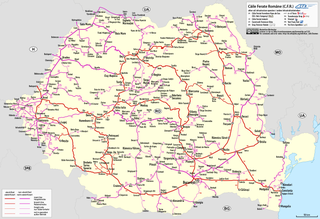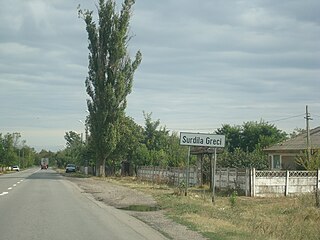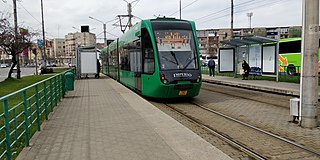Căile Ferate Române was the state railway carrier of Romania. The company was dissolved on 1 October 1998 by splitting into several successor companies. CFR as an entity existed from 1880, even though the first railway on current Romanian territory was opened in 1854. CFR was divided into four autonomous companies:

The city of Buzău is the county seat of Buzău County, Romania, in the historical region of Muntenia. It lies near the right bank of the Buzău River, between the south-eastern curvature of the Carpathian Mountains and the lowlands of Bărăgan Plain.

Bucharest North railway station is the main railway station in Bucharest and the largest railway station in Romania. The vast majority of mainline trains to and from Bucharest originate from Gara de Nord.

The Talent is a multiple unit railcar manufactured by Bombardier that was developed by Waggonfabrik Talbot in Aachen shortly before the company was acquired by Bombardier in 1995. The name Talent is an acronym in German for TALbot LEichter Nahverkehrs-Triebwagen.

The first railway in the Kingdom of Romania opened in 1869 and linked Bucharest and Giurgiu. The first railway on electric current in the current Romanian territory opened in 1854, between Oravița and Baziaș in Banat, right next to the border with Serbia; however, that region was under the administration of the Austrian Empire at the time, and became part of Romania after World War I.

The Buzău river in eastern Romania is a tributary of the river Siret. Its total length is 302 km, and its drainage basin area is 5,264 km2. Its source is in the south-eastern Carpathian Mountains, east of Brașov. The Buzău flows through the Romanian counties Brașov, Covasna, Buzău and Brăila. It flows into the Siret in Voinești, close to its confluence with the Danube, west of Galați.

Transelectrica is an electricity transmission system operator in Romania. It is publicly traded company with 58,69% of the shares being held by the Ministry of Economy and Commerce, 13,5% by Fondul Proprietatea, and 27,81% being floated on the Bucharest Stock Exchange or held by other investors. It is listed at the Bucharest Stock Exchange.
Viorel Ion is a Romanian football manager. Throughout his playing career, Viorel Ion played for several teams, including Oțelul Galați, Steaua București, VfL Bochum and Rapid București. He was player-manager of Gloria Buzău, which he helped promote to Liga I during the 2006–07 season.
Grup Feroviar Român, or simply GFR, is the largest private railway company in Romania and one of the largest in South Eastern Europe. Founded in 2001, the company owns freight operations in Romania, Hungary, Bulgaria, Greece, Serbia, Ukraine, Moldova, Montenegro and Mozambique, and railcar production and maintenance operations in Romania, Hungary, Serbia and Ukraine. In 2010 GFR operated a park of over 13,500 railroad cars and 285 diesel and electric locomotives.

Surdila-Greci is a commune located in Brăila County, Muntenia, Romania. It is composed of four villages: Brateșu Vechi, Făurei-Sat, Horia, and Surdila-Greci.
GSP Saturn is a semi-submersible, jackup independent leg cantilever drilling rig operated by GSP Drilling, a Grup Servicii Petroliere subsidiary, and currently contracted by Wintershall Noordzee for drilling in the North Sea. The drilling unit is registered in Panama.
GSP Orizont is a semi-submersible, jackup independent leg cantilever drilling rig operated by GSP Drilling, a Grup Servicii Petroliere subsidiary, and currently contracted by Iranian Offshore Engineering and Construction Company for drilling in the Iranian section of the Persian Gulf. The drilling unit is registered in Malta.

Romanian railway services is an index page of all the rail services operated in Romania. Railway services in Romania are operated by the following operators :

Galați is a railway station located in Galați, Galați County, Romania. The station is located on the Galați – Bucharest, Galați – Giurgiulești, Galați – Bârlad, and Galați – Tecuci lines.
ASTRA Arad, also known as Întreprinderea de Vagoane Arad (IVA), is the name of a group of industrial engineering and rolling stock companies originated in Arad, Romania. Operating as a single entity until 1996, the company then split into other independent companies, Astra Vagoane for freight cars production, Astra Vagoane Călători for passenger coaches and trams, and Astra Bus for bus and trolleybus manufacturing.

CFR Marfă is the state-owned freight railway business of Romania.

Transferoviar Călători (TFC), a subsidiary of Transferoviar Grup, is a private railway operator from Romania that has as its main activity the public passenger transportation that is assured on 7 non-interoperable lines as well as on interoperable infrastructure. These routes are served with short to medium haul light rolling stock, diesel multiple units consisting of two or three carriages. Units can be coupled together to cope with rush hour services.

The BB 25100 is a class of electric locomotives in service with the French railways SNCF, built by Materiel de Traction Electrique (MTE) in 1967. They are dual voltage locomotives working off both 1500 V DC and 25 kV 50 Hz AC with a top speed of 130 km/h (81 mph). The class was designed by André Jacquemin.

Astra Imperio is a tram produced by the Romanian company Astra Vagoane Călători in Arad. It is a 100% low-floor, designed in partnership with Siemens. Imperio's design is based on the Avenio platform using electronic and traction equipment supplied by Siemens Mobility. It is also available with local electronic and traction equipment supplied by ICPE-SAERP, using IVF 260FR inverters, along with SATREC and MBB31 control units; this variant, called Autentic, uses VEM DKABZ 0310-4 motors instead.

Düwag Wadloper is a family of diesel railcars and diesel multiple units produced by the German Düwag plant in Düsseldorf. Between 1981 and 1983, a total of 50 vehicles of this kind were built specifically for the Dutch Nederlandse Spoorwegen railroad. At the beginning of the 21st century, they were mainly operated by private carriers; in 2006 they began to be phased out, and in 2008 they were sold to other countries. The trains went to carriers from Poland, Argentina and Romania. They were operated by Przewozy Regionalne, Masovian Railways and Koleje Śląskie, and also used by Trenes de Buenos Aires to operate a cross-border service between Argentina and Uruguay. They currently operate services connecting Argentina with Paraguay, and are operated in Poland by SKPL Cargo, as well as on several lines in Romania.














